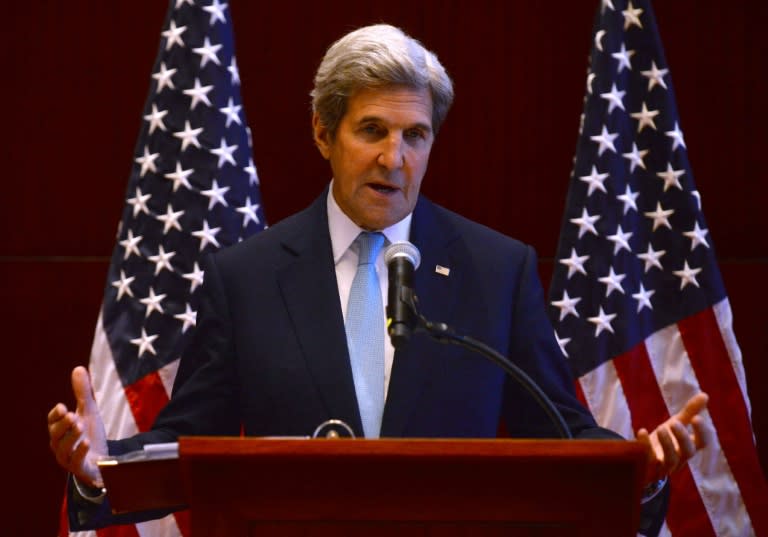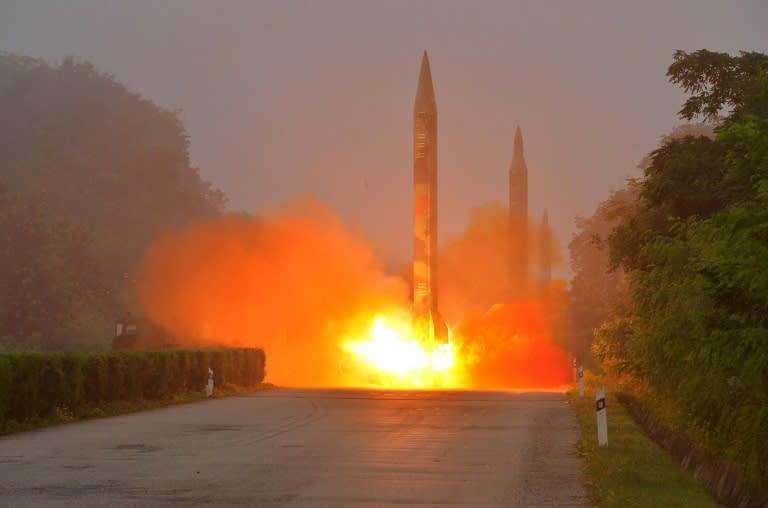US warns North Korea of 'real consequences' for weapons tests
The United States warned North Korea on Tuesday of "real consequences" if it continues nuclear and missile tests in defiance of UN sanctions, as the international community moves to rein it in. Pyongyang carried out its forth nuclear test in January, followed by a series of ballistic missile launches that sent tensions soaring across East Asia and beyond. In response the UN Security Council slapped North Korea with its toughest sanctions to date in a unanimous decision even endorsed by China, its economic lifeline and diplomatic shield. But Pyongyang has continued to carry out missile launches -- most recently last week -- in a bid to prove that sanctions are ineffective in curbing its weapons development. "Together we are determined... to make absolutely certain that DPRK (North Korea) understands that there are real consequences for these actions," US Secretary of State John Kerry told reporters on the sidelines of a meeting of Asian nations in Laos. Analysts say this year's tests have shown the North making progress towards its goal of developing a credible strike threat against the US mainland, adding urgency to Washington's warnings. The issue has dominated this week's talks in Vientiane, a rare opportunity for the six parties involved in stalled talks on ending North Korea's nuclear programme to be in the same room. The North's new foreign minister and former nuclear negotiator Ri Yong-Ho was making his diplomatic debut at the meeting, hosted by the 10-member Association of Southeast Asian Nations (ASEAN). Kerry, who has held a flurry of closed-door meetings with his regional counterparts over the last two days, said efforts to denuclearise the Korean peninsula had dominated discussions. "(The) issue that came up in nearly every meeting I had so far this week is the provocative and deeply concerning behaviour of the DPRK," he told reporters. "North Korea's actions present a very serious threat, not just to this region but to international peace and security." Later Tuesday afternoon six-party members -- the US, China, Japan, Russia and both Koreas -- were among those attending the ASEAN Regional Forum (ARF), a security meeting that groups most of Asia. - 'Cannot be tolerated' - The nuclear threat from the North was expected to feature strongly, with Beijing likely to press for a revival of the talks last held in 2008. But Washington, Seoul and Tokyo all insist Pyongyang must first make tangible steps towards denuclearisation. At a regional meeting preceding ARF which excluded the North's envoy, Japan's Foreign Minister Fumio Kishida told ministers that Pyongyang's continuing missile and nuclear testing "cannot be tolerated". In a briefing afterwards, foreign ministry spokesman Yasuhisa Kawamura said the grouping had "made strong demands North Korea should refrain from any further provocative actions and comply with UN security resolutions". The North's relentless sabre-rattling has sent waves of uncertainty across Asia and beyond. Washington and Seoul agreed earlier this month to deploy a sophisticated anti-missile system in South Korea, a move which spooked China and Russia, who worry about having the advanced US-made system on their doorstep. North Korea's Ri met his Chinese counterpart Wang Yi on Monday but few details have been released. Beijing is Pyongyang's main ally but its patience has worn thin as the North refused to rein in its weapons programme. China is, however, wary of pushing the North too far, fearing a regime collapse that could create a refugee crisis on its border and swing the regional balance of power towards the US. Before Kerry's visit a State Department official played down the likelihood of him meeting Ri. But the official added: "I think that the North Korean foreign minister will again hear from not only the Secretary of State but from others in the room that the world is not prepared to accept North Korea as a nuclear state."



